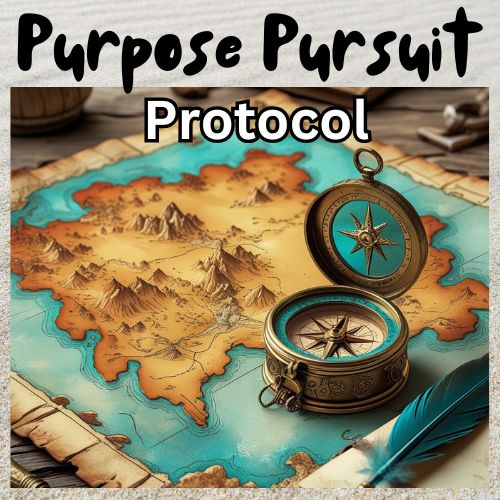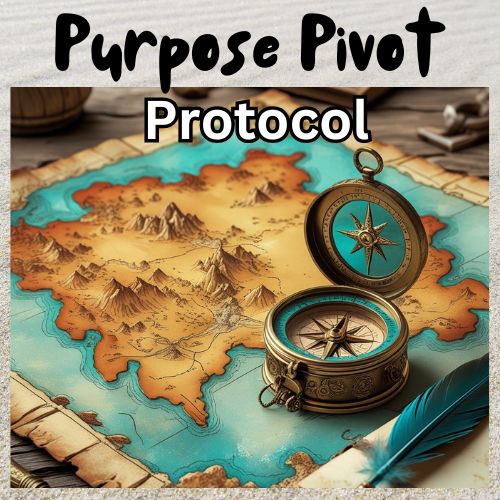The Hidden Cost of Hunting for Your Life’s Mission
Maya Angelou was a dancer, singer, actress, poet, civil rights activist, journalist, and memoirist. Steve Jobs dropped out of college, studied calligraphy, travelled to India, co-founded Apple, was fired from his own company, started Pixar, returned to Apple, and revolutionised multiple industries. Leonardo da Vinci painted, sculpted, engineered, studied anatomy, designed flying machines, and mapped waterways.
Were these people confused about their purpose? Or were they onto something we’ve forgotten?
The Modern Purpose Prison
Somewhere along the way, we convinced ourselves that fulfilled people have discovered their “one true calling”—a singular, unchanging purpose that defines their entire existence. Career counsellors tell us to find our passion. Life coaches insist we uncover our unique mission. Self-help books promise that once we identify our purpose, everything will click into place.
But what if this advice, however well-intentioned, is creating more problems than it solves?
The Data Tells a Different Story
The numbers reveal a fundamental mismatch between our purpose mythology and reality. The Bureau of Labour Statistics shows that the average person changes careers, not just jobs, but entire career paths—5 to 7 times during their working life. Among millennials and Gen Z, this number is climbing even higher.
This isn’t a sign of generational restlessness or lack of commitment. It’s adaptation to a world where the half-life of skills is shrinking, where entire industries emerge and disappear within decades, and where the problems worth solving evolve faster than ever before.
Research by organisational psychologist Adam Grant adds another layer to this puzzle. His studies found that people who maintain what he calls “multiple selves”—different identities across various life domains—report higher life satisfaction than those who rigidly adhere to a single, unified identity. The jack-of-all-trades, it turns out, may be happier than the master of one.
The Historical Perspective We Forgot
The idea that everyone should have one defining purpose is remarkably recent. For most of human history, adaptability trumped specialisation. A medieval farmer was also a builder, healer, storyteller, and community organiser, depending on the season and circumstance. Indigenous cultures worldwide still emphasise cyclical purposes that shift with life stages rather than permanent callings.
The singular purpose narrative gained traction during the Industrial Revolution, when economic efficiency demanded specialised roles. We needed people to spend their entire lives making pins or operating looms. The Protestant work ethic reinforced this with moral weight: your job wasn’t just economic activity; it was your divine calling.
But we’re no longer in the Industrial Age. Why are we still using its playbook for human fulfilment?
The Seasonal Purpose Alternative
What if, instead of seeking the purpose, we embraced seasonal purposes—meaningful pursuits that evolve as we grow, as circumstances change, and as the world transforms around us?
Consider the software engineer who spends five years building apps, then transitions to teaching coding to underserved communities, then moves into policy work on digital equity. Each phase built on the previous one, but none was meant to be permanent. Each season served both personal growth and societal need.
Or the marketing professional who discovers environmental advocacy during a career break, integrates sustainability into their corporate role, then eventually starts a social enterprise. The thread isn’t a predetermined purpose—it’s a commitment to meaningful contribution that adapts to new understanding and opportunities.
The Liberation of Letting Go
When we release the pressure to find our “one true calling,” several things happen:
We become more experimental. Without the weight of finding the perfect purpose, we can try things, learn, and adjust without feeling like failures.
We develop resilience. Multiple sources of meaning create a more stable foundation than a single pillar of purpose.
We stay relevant. As the world changes, we can change with it rather than desperately trying to preserve a fixed identity.
We reduce anxiety. The paralysing question “What’s my purpose?” transforms into the energising question “What’s worth contributing to right now?”
A Different Question
Perhaps the real question isn’t “What’s my purpose?” but rather “How can I remain purposeful?” The difference is subtle but profound. One seeks a destination; the other embraces a way of travelling.
The next time someone asks about your life’s purpose, consider this: maybe you don’t need to find it. Maybe you need to choose it, season by season, with intention and openness to what comes next.
The Purpose Trap
1. Controversial Question
“What if the advice that’s supposed to unlock your potential is actually the thing keeping you stuck?”
- Every graduation speech tells you to “follow your passion”—so why are 70% of people disengaged at work?
- If finding your purpose is the key to happiness, why do so many purpose-driven people burn out?
- What if the people living the most fulfilling lives never asked “What’s my purpose?” at all?
2. Relatable Scenario (The Trap)
Meet Sarah, the Modern Purpose Seeker
Sarah is 28, college-educated, and deeply unsatisfied. She’s read every book on finding your calling, taken personality tests, hired a life coach, and attended “Discover Your Purpose” workshops. She journals about her values, meditates on her mission, and constantly asks herself: “What am I meant to do?”
But here’s what’s happening: Every job opportunity gets filtered through the impossible question of whether it’s her “true calling.” She turns down interesting projects because they don’t align with her supposed purpose. She feels guilty pursuing multiple interests because she should be “focused.” She’s paralyzed by the weight of choosing correctly—because what if she picks wrong?
Sarah represents millions of smart, capable people who’ve turned purpose-finding into a full-time job that prevents them from actually living purposefully.
The mainstream belief in action:
- Purpose must be discovered, not chosen
- You have one true calling waiting to be found
- Once found, you should organize your entire life around it
- Deviation means you’re lost or uncommitted
3. Turning Point (The Insight)
The Day Sarah Met Elena
Sarah’s breakthrough comes through an unexpected conversation. She meets Elena, a 45-year-old who seems remarkably fulfilled despite having what Sarah considers a “scattered” resume: former teacher, nonprofit director, startup founder, current city council member, and weekend pottery instructor.
“How did you find your purpose?” Sarah asks, expecting the usual discovery story.
Elena laughs. “I didn’t find it. I chose it. Multiple times.”
This conversation introduces the counterintuitive truth: The most purposeful people don’t have a purpose—they have a practice of choosing meaningful work that evolves with them.
Key realisation moments:
- Elena’s “scattered” path actually created a unique skill set nobody else had
- Her willingness to change direction led to opportunities that didn’t exist when she started
- She never felt lost because she wasn’t looking for something hidden—she was creating something new
- Her multiple interests reinforced each other rather than competing
4. Resolution (The Reframe)
From Purpose-Finding to Purpose-Making
Sarah’s entire framework shifts. Instead of asking “What’s my purpose?” she starts asking “What’s worth doing now?” Instead of seeking her calling, she begins making choices.
She takes the marketing job that interests her, not because it’s her life’s work, but because it teaches valuable skills. She volunteers with the environmental group, not because it’s her destiny, but because it matters to her right now. She keeps writing on weekends, not because she’s meant to be an author, but because she enjoys the process.
Six months later, Sarah has created an unexpected opportunity: the environmental group needs marketing help, her writing skills help her communicate complex ideas, and her corporate experience lets her navigate organisational challenges. She’s not following a predetermined path—she’s building one.
The new operating system:
- Purpose is created through choices, not discovered through introspection
- Multiple interests create unique value combinations
- Seasonal purposes allow for growth and adaptation
- Meaningful work emerges from action, not analysis
5. Closing Takeaway
Your Next Season Starts Now
The most liberating realisation isn’t finding your purpose—it’s recognising you don’t need to find it at all. You need to choose it, season by season, with intention and courage.
Stop waiting for clarity. Start making choices.
Stop seeking your calling. Start answering calls that matter.
Stop trying to discover who you’re meant to be. Start deciding who you want to become.
The Challenge: What if you spent the next month saying yes to opportunities that intrigue you, regardless of whether they fit your “purpose”? What if you trusted that meaningful work emerges from engagement, not from endless preparation?
Your future self isn’t waiting for you to find the right path. They’re waiting for you to start walking.
Don’t ask “What’s my purpose?” Ask “What purpose will I choose today?”
Having a purpose is of such primordial importance to me, that I have created two “Define Your Life Purpose” Mentoring Programs: The Purpuse Pursuit Protocol is for you if you are still searching for your life purpose, and the Purpose Pivot Protocol – perfect if you have a life purpose that needs adjusting.

The Purpose Pursuit Protocol – if you want to discover your life purpose, this course will provide you with the clarity, motivation and direction you need to manifest your next chapter – in both your personal and professional life. Get immediate access

The Purpose Pivot Protocol – drawing inspiration from the Camino de Santiago, this transformative course guides you through a proven framework to recalibrate your authentic purpose and create a meaningful and fulfilling next act. Get immediate access
Research
Kim ES, Chen Y, Nakamura JS, Ryff CD, VanderWeele TJ. Sense of Purpose in Life and Subsequent Physical, Behavioural, and Psychosocial Health: An Outcome-Wide Approach. Am J Health Promot. 2022 Jan;36(1):137-147.

